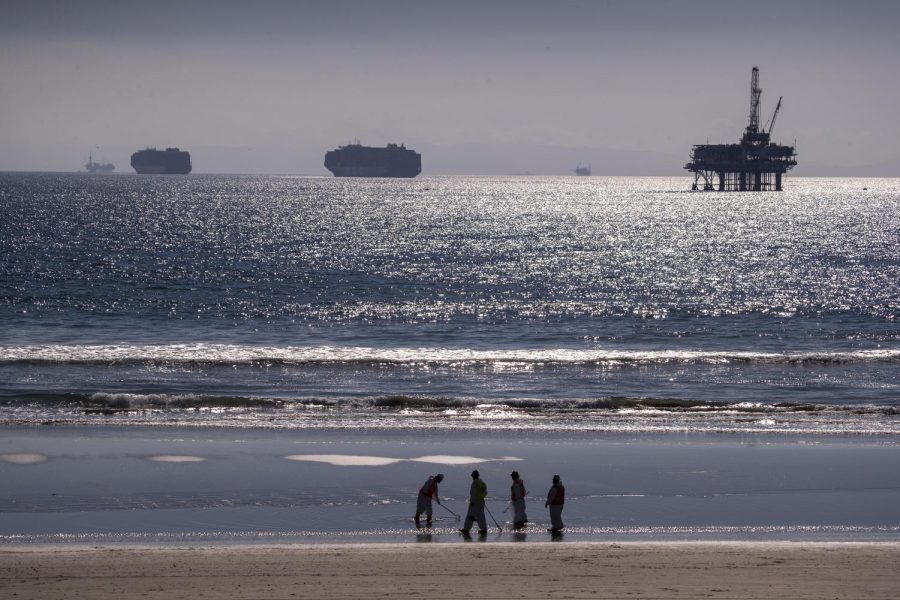What To Know About the Huntington Beach Oil Spill
Photography by: Allen J. Schaben/Los Angeles Times/TNS
Environmental group clean-up crew combs the beach for oil chunks following the Huntington Beach oil spill.
On October 2nd, 2021, officials initially reported over 120,000 gallons of crude oil, a liquid fuel source commonly used for plastic products and transportation, had burst out of a torn pipeline 9 miles out from the coast of Huntington Beach and made its way alongside the Southern Californian coast.
At the time of writing this article, the amount of oil released has been confirmed to be about 25,000 gallons. Of this number, approximately 5,544 gallons of oil (22%) have been successfully extracted from the water. Recent investigations also note that the pipeline’s protective shell had been knocked off approximately a year prior to October 2nd, and was likely only dragged out recently after having leaked untraceable amounts of oil into the ocean.
The affected pipeline belongs to the oil and natural gas production company, Amplify Energy Corporation, which is in Houston, Texas. The tear has been identified as a 13-inch split that had been torn 105 feet away from its designated place due to the dragging of a commercial ship’s anchor. As for the pipeline itself, it is 17 miles long, 16 inches in diameter, and predicted to be 41 years old.
Workers at the Elly platform were initially alerted to a possible emergency but ultimately instructed to resume operations. For three hours, oil manufacturers continued working while the tear was exposed and oil spewed into the ocean.
“We were not aware of any spill until 8:09 a.m. on Saturday morning,” says Martyn Willsher, current President and Chief Executive Officer of Amplify Energy Corporation. Allegations of officials prolonging to alert cleanup crews after knowing about the spill for 12 hours spread, but Willsher responded, “If we were aware of something on Friday night … we would have immediately stopped all operations.”
Beta Offshore, Amplify Energy Corporation’s Southern California division, has been directed to shut down the pipeline entirely and submit a formal maintenance and inspection report before resuming operations as of October 5th. Local fishermen have been instructed to cease operations, and cargo ships have been hindered from docking in Huntington Beach and Long Beach, two of the nation’s largest ports.
Orange County Representative Michelle Steel, along with ten other local leaders including Huntington Beach Mayor Kim Carr, requested that President Joe Biden declare a major disaster declaration, though many argue that an oil spill of this size does not qualify under the strict rules of presidential disaster declarations.
On a local scale, for eight days following the big spill, Governor Gavin Newsom declared a state of emergency and instructed Californians to stay away from the beach for their own safety. Huntington Beach, Huntington State Beach, Bolsa Chica, Newport Beach, Newport Harbor, Dana Point Harbor, Laguna Beach, and Crystal Cove remained taped off from the public until water quality tests came back with acceptable results that would not endanger the public with toxic chemicals. On October 12th, California State Parks and city officials stated that “water quality testing results showed non-detectable amounts of oil associated toxins in…ocean water” and beaches were permitted to re-open.
This return of beach-side activity also came about due to the massive industry of businesses who rely on open beaches and the crowds they accumulate speaking out on their concerns for the local economy. Between cargo ships being prohibited from docking, surfing schools losing business, and the general morale of beachside residents plummeting, officials have been drowning in demands to re-open.
Huntington Beach residents, among many others, have been using their voices to raise awareness on the issue of oil drilling and the dangers that the practice inflicts on the environment, including but not limited to the disruption of marine ecosystems and extreme cases of pollution. Volunteers have begun donating to organizations working to push local and federal governments to properly minimize current and future environmental threats — much to the surprise of local environmentalists dedicated to such causes year-round.
“I do think that people are mobilizing, which is fantastic, and showing that they do truly care about the environment which I was very inspired by. That’s very exciting to see,” says Rosanna Harshman, Environmental Literature teacher on the Huntington Beach High School campus. “It seems that people are stepping up and doing what needs to happen, but does that change the fact that we will continuously have offshore drilling? That’s where the problem lies.”
As of October 21st, calls for political change has sped up the process of Laguna Beach and Huntington Beach passing anti-drilling resolutions that have been in consideration since 2017. Huntington Beach now prohibits all new oil-drilling plans, and Laguna Beach has gone one step further by demanding an end to all drilling projects, current, and future.
Multiple businesses and areas affected by this oil spill, like Banzai Surfing School and Costa Mesa’s Ketcham Tackle, have begun filing lawsuits against Amplify Energy Corp. while others take to the streets to protest in support of the Build Back Better Act, which is currently being proposed in Congress. The Act outlines a long-term plan for reducing carbon emissions to 50-52% while keeping energy costs low in addition to various other environmental causes.
Animal hospitals and wetland reserves have also been hit with exceptional support and donations to save the environment in this time, though upon the time of receiving money and supplies, not many animals had been impacted by the oil spill. Animals have been hospitalized and the effects of the oil spill will impact these species for a very long time, but currently, institutions dedicated to aiding affected ocean-residing animals have expressed hope that residents will push their attentions to political action rather than band-aid solutions.
“You can still donate to those causes — a lot of them are non-profits, so they need money…these wetlands are going to have to have some restoration plan in effect after we assess the damage and see how quickly the oil [has] cleaned up…donating money…is never a bad thing — but…taking action politically is [going to] be where we make change,” says Harshman.
“[As of October 3rd], Unified Command reported that they have not observed any free-floating oil in recent days,” says Nancy Caruso, local marine biologist and founder of Get Inspired, a registered non-profit organization dedicated to educating youth about environmental issues and encouraging community members to take action. “Fortunately, there was no significant wind or swell [in] the week following the oil spill. So current was the only thing moving the oil. It also sinks over time so the good thing is that it was not splattered onto our shores.”
Organizations like the Bolsa Chica Wetlands Reserve have continued hosting beach clean-ups, warning volunteers to report large tarballs if they find them amongst the trash. Sadie Perlman, a sophomore student at Huntington Beach High School, participated in a beach cleanup and says “[they] were told that if [they] saw tarballs at the cleanup, that [they] should call for the cleanup leader. Luckily, [they] didn’t see any and the south side of the wetlands have… been okay.”
Professionals in the environmental field advise residents to generally stay away from the ocean as much as possible after a spill; eating fish that have been swimming in oil or swimming in waters recently contaminated with oil have direct links to decreased life expectancy, increased risk of developing cancer, and deteriorating the respiratory system among other symptoms of irritating rashes and nausea.
Students and community members can still use their voices to help. The Huntington Beach High School’s Green Team Club and Surfrider Club meet year-long to discuss environmental issues. The California Department of Fish and Wildlife will soon be looking for volunteers: preferably 18 or older, and training sessions for specific and needed skill sets will be available soon using this form. ArcGIS Story Maps supporting the USC Sea Grant Program consistently updates its website with current information on the oil spill, which can be found here.
Your donation will support the student journalists of Huntington Beach High School. Your contribution will allow us to cover our annual website hosting costs.
Thank you for supporting our program!







